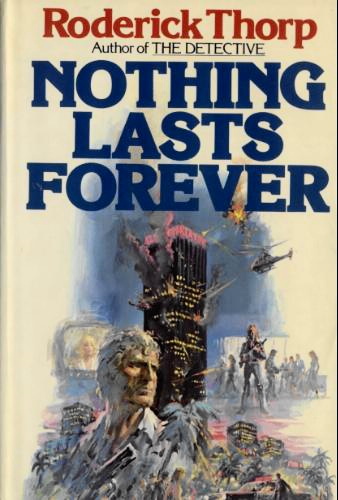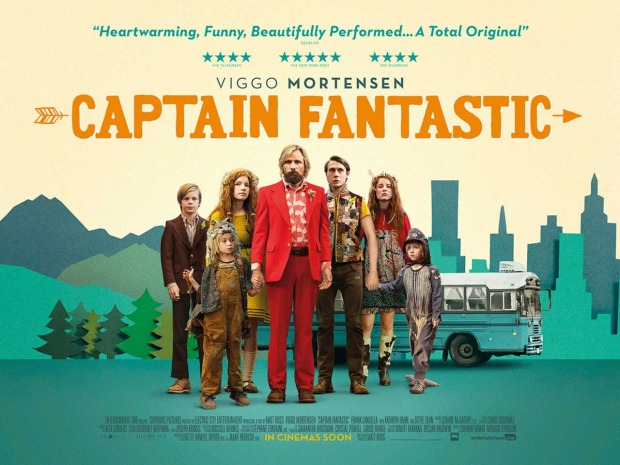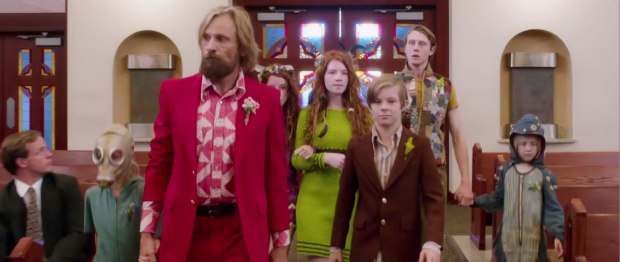
You take his family. He’ll take your life.
Nothing Lasts Forever Review
Written By Roderick Thorp
Year Published: 1979
Genre: Action/Drama
Page Number: 188
Wrong Spoilers Right Time
Since you’re all likely into the post-holiday blues by now, let’s try and continue that theme with the novel that inspired the beloved holiday classic, “Die Hard.” Yes, you heard right, the book “Nothing Last Forever” was eventually adapted into “Die Hard”. While the basic plots are the same there are some differences. In “Nothing Last Forever” Joe Leland (not John McClain) elderly former cop, turned private detective, turned private security consultant goes to Los Angeles to visit his daughter Holly Genaro while she attends her office Christmas party at the Klaxxon oil company along with her children. While the employees celebrate the year especially their multimillion-dollar bridge deal with Chile, a ruthless gang of German terrorists take over the building leaving only Joe free. He decides to put his lifetime of skills to work and defeat the terrorists. While the big points are the same in both the book and movie, almost everything else is different.
While it has a smaller body count and better writing than most of its contemporaries “Die Hard” is an action movie thru and thru. “Nothing Lasts Forever” however, is a hardboiled detective story with a lot of action; this is the biggest change between the two. While John McClain is frequently pissed off in “Die Hard” he’s a ray of sunshine next to Joe Leland. Like any hardass old ex-cop worth his fedora, Joe has very little nice to say about anything. Joe’s not in L.A. for more than ten minutes before he starts saying that the city looks like a shaved cat and he pegs Holly’s boss and co-workers as assho#$s soon after he meets them (he right of course, but that doesn’t make him sound any less bitter). The grim tone lasts during the entire book and is especially prevalent at the end.
Like any hardass old ex-cop worth his fedora, Joe has very little nice to say about anything. Joe’s not in L.A. for more than ten minutes before he starts saying that the city looks like a shaved cat and he pegs Holly’s boss and co-workers as assho#$s soon after he meets them (he right of course, but that doesn’t make him sound any less bitter). The grim tone lasts during the entire book and is especially prevalent at the end.
The novel is told entirely from Joe’s viewpoint and this leads to big character changes. While “Die Hard” has an excellent cast of supporting characters, “Nothing Lasts Forever” saves all its characterization for the main lead and the main villain. This changes to the hero’s and villains are what help keep the book unique. In “Die Hard” the so-called terrorists were actually just a band of thieves while in “Nothing Lasts Forever” the terrorists are exactly what they seem. In “Die Hard” the contrast is between the high-class European thieves and their blue collar American enemy while in “Nothing Lasts Forever” the battle is very much age vs. youth.
In “Die Hard” the so-called terrorists were actually just a band of thieves while in “Nothing Lasts Forever” the terrorists are exactly what they seem. In “Die Hard” the contrast is between the high-class European thieves and their blue collar American enemy while in “Nothing Lasts Forever” the battle is very much age vs. youth.
While it is mentioned once that the terrorist leader Anton Gruber comes from a wealthy background what is more often remarked on is that some of the terrorists are barely older than teenagers in contrast to the sixty-year-old Joe Leland. The book is much darker due to this change especially since half the terrorists are women. This is one of the best changes as it makes the rank and file terrorists much more unique and memorable.
What was especially surprising to me was the lack of overt politics in the book. It’s not that politics are totally absent from the book but for a book published during the cold war it’s surprising to see nothing about communism or the Soviet Union. This is even more surprising given that Anton Gruber is said to have begun his career in crime with the German Marxist Baader-Meinhof gang.
I’m torn on this, while I’m no fan of political rants it would have been interesting to add another difference between Joe and the terrorists especially since the ending reveals them to be quite justified. While I am happy the main villain got more back-story Anton Gruber simply can’t compare to Alan Rickman’s utterly superb turn as Hans Gruber. But villains are nothing without an interesting hero to go against and Joe Leland brings a lot to the table
Joe Leland first appeared in “Thorp’s previous novel “The Detective.” Fortunately, the events of “The Detective” are recapped in the begging of the book and don’t effect the events of the book except by explaining how the main character’s background. Joe Leland is a former WW2 fighter pilot, turned police detective, turned private detective, turned security consultant. He gained fame from solving a controversial case during his police years, only to find out many years later a private detective that he arrested the wrong man. While this case also revealed massive amounts of municipal fraud, the ones responsible escaped punishment.
All this plus the divorce and later death of his wife along with his estrangement from his daughter and grandchildren have left him with a very cynical and world-weary mindset. All this trauma and experience makes Joe a man who thinks a lot but says little. While this allows a huge incite into what Joe’s history and thought process, it also has a downside.
This is one of the few novels where I feel like we learn too much about a character. Joe will flashback: to the end of his marriage, the history of his daughter, security conferences, and even old romances. While everything we learn is interesting and informative, sometimes it comes out of nowhere and disrupts the story. Fortunately, these little asides never come in the middle of anything and aren’t very long.
Joe’s checkered past also make’s him a ruthless mofo during the course of the book. Due to his security consulting experience Joe is familiar with Gruber’s past and he absolutely despises him and all his followers. He’s much more brutal in dispatching them, even to the point where he has one at gun point and just because he’s suspects they young terrorist is about to go on a righteous rant Joe shoots him in the neck and tosses his body off the roof. Joe’s kill’em all attitude is explained by his conflict fueled past making him a more violent person and his fear that if the police lay siege to the building his loved ones will be collateral damage. While Joe isn’t as likable a character as John McClain he’s definitely entertaining and you’ll be rooting for him by the end. This ruthless attitude culminates in a massively different ending for the book.
While “Die Hard” is a simple tale of a lone hero struggling against murderous thieves and an incompetent police department “Nothing Lasts Forever” in true noir style is much more gray in its morals. I was defiantly a fan of this change as it’s both interesting and great discussion material. It’s often brought up that Joe may be doing more harm than good in fighting the terrorists and the ending brings that into focus.
On route to their final showdown, Gruber tells Joe that his gangs’ plan was to take the tower hostage due to the bridge being a cover for selling arms to the murderous, U.S backed Chilean government (Google Augusto Pinochet if you want to know more about that). They planned to execute the C.E.O as an example to other corporations then take the six million dollars in the company vault and dump it out the windows returning it to the people. After this, they would escape with no deaths but a heartless corporate snake. While it’s possible that Gruber is lying, later evidence reveals that the bridge was a front and the executives, including Holly were in on the whole thing.
Speaking of Holly she doesn’t fare nearly as well as John McClain’s wife, after Joe and Gruber’s climatic showdown a mortally wounded Gruber grabs Holly by her new watch and they both topple out an open window to their deaths. Joe then mercilessly executes the surviving terrorists and dumps the money out the window anyway. While this end was absolutely crushing it fit with the rest of the book and further called Joe’s actions into question. While it’s certainly not as fun as “Die Hards” ending it’s definitely more interesting.
While “Die Hard” is an essential action classic that should be watched by everyone who is even marginally interested in good action, the book is quite different. Anyone going into the book expecting the same story as the movie will be very disappointed, especially by the very different tone. However, if you’re a fan of complex noir stories (which I am) you’ll definitely find something to like about “Nothing Last Forever”
F.A.Q’s
Did I like the book: Yes
Would I read it again: Yes
Would I buy it: Yes
Two fish run into an underwater concrete wall what do they say: Dam


